Corporate Law Assignment: Breach of Duty and Clive Palmer's Case
VerifiedAdded on 2023/06/07
|6
|1409
|490
Report
AI Summary
This corporate law report analyzes the case of Clive Palmer and Queensland Nickel, focusing on the alleged breach of director's duties as outlined in the Corporations Act 2001. The report examines Section 184 of the Act, which addresses reckless behavior, misuse of position, and the use of information for personal gain. The discussion centers on Palmer's actions, including the transfer of $200 million from Queensland Nickel to fund his political party and other investments, and the subsequent collapse of the company. The analysis reveals that Palmer is likely guilty of breaching his duties to act in good faith and in the best interest of the company, and that his actions led to negative consequences for stakeholders, including the unemployment of nearly 800 employees. The report also details the potential penalties for such offenses, including fines, compensation, and potential bans from managerial roles. In conclusion, the report suggests that Palmer should be prosecuted for his actions, and that such action will set a precedent for future directors and contribute to the betterment of the Australian corporate world.
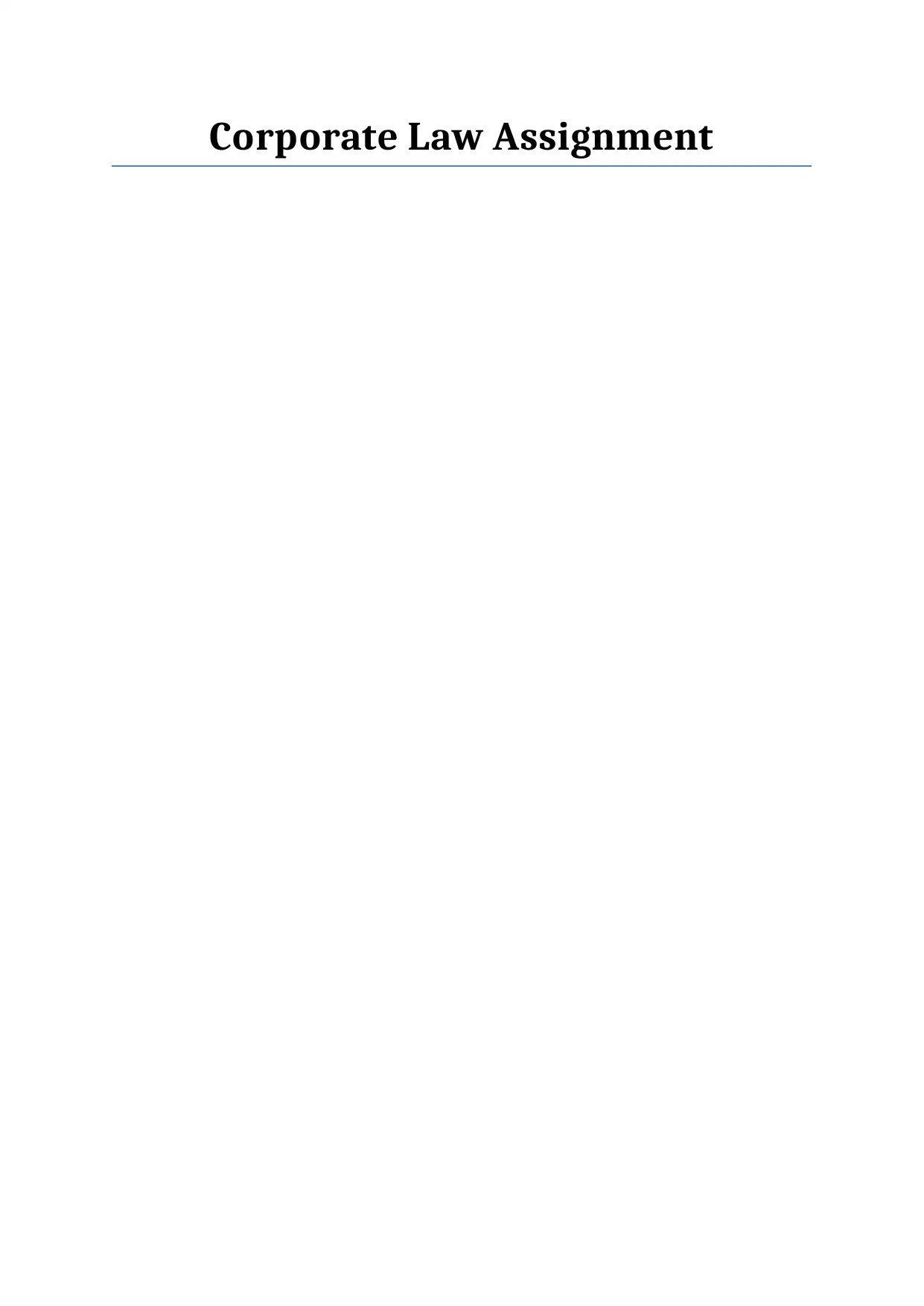
Corporate Law Assignment
Paraphrase This Document
Need a fresh take? Get an instant paraphrase of this document with our AI Paraphraser
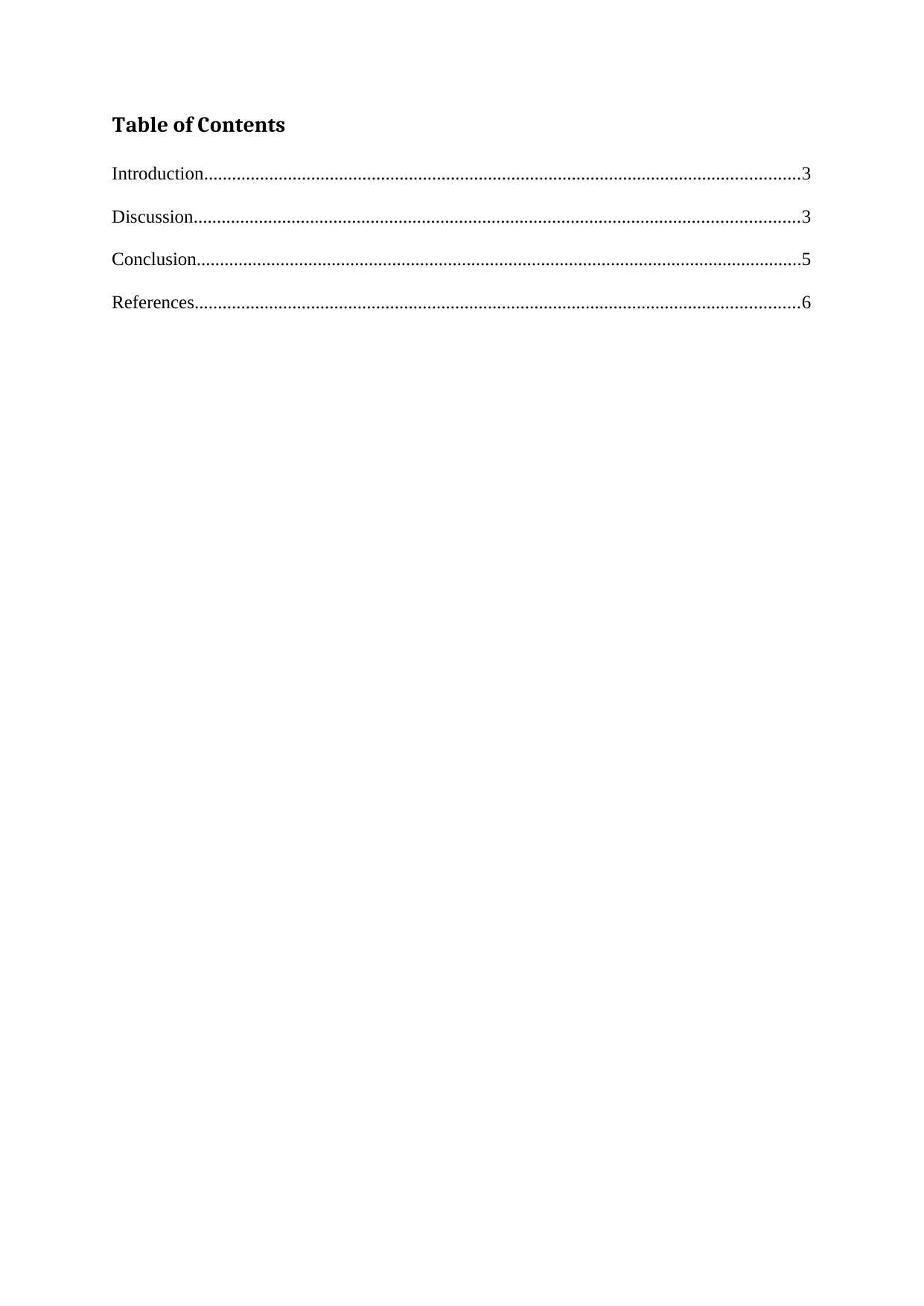
Table of Contents
Introduction................................................................................................................................3
Discussion..................................................................................................................................3
Conclusion..................................................................................................................................5
References..................................................................................................................................6
Introduction................................................................................................................................3
Discussion..................................................................................................................................3
Conclusion..................................................................................................................................5
References..................................................................................................................................6
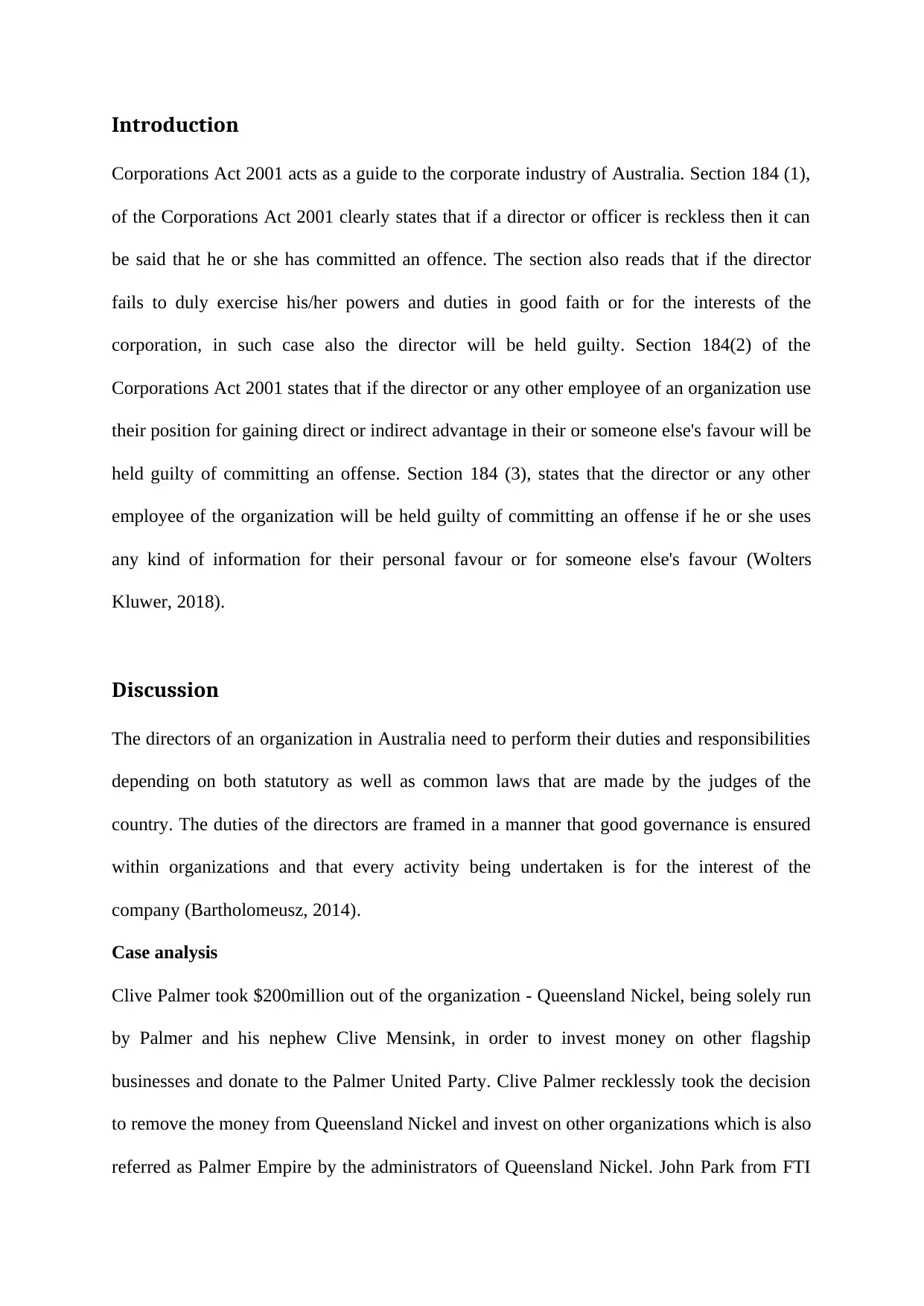
Introduction
Corporations Act 2001 acts as a guide to the corporate industry of Australia. Section 184 (1),
of the Corporations Act 2001 clearly states that if a director or officer is reckless then it can
be said that he or she has committed an offence. The section also reads that if the director
fails to duly exercise his/her powers and duties in good faith or for the interests of the
corporation, in such case also the director will be held guilty. Section 184(2) of the
Corporations Act 2001 states that if the director or any other employee of an organization use
their position for gaining direct or indirect advantage in their or someone else's favour will be
held guilty of committing an offense. Section 184 (3), states that the director or any other
employee of the organization will be held guilty of committing an offense if he or she uses
any kind of information for their personal favour or for someone else's favour (Wolters
Kluwer, 2018).
Discussion
The directors of an organization in Australia need to perform their duties and responsibilities
depending on both statutory as well as common laws that are made by the judges of the
country. The duties of the directors are framed in a manner that good governance is ensured
within organizations and that every activity being undertaken is for the interest of the
company (Bartholomeusz, 2014).
Case analysis
Clive Palmer took $200million out of the organization - Queensland Nickel, being solely run
by Palmer and his nephew Clive Mensink, in order to invest money on other flagship
businesses and donate to the Palmer United Party. Clive Palmer recklessly took the decision
to remove the money from Queensland Nickel and invest on other organizations which is also
referred as Palmer Empire by the administrators of Queensland Nickel. John Park from FTI
Corporations Act 2001 acts as a guide to the corporate industry of Australia. Section 184 (1),
of the Corporations Act 2001 clearly states that if a director or officer is reckless then it can
be said that he or she has committed an offence. The section also reads that if the director
fails to duly exercise his/her powers and duties in good faith or for the interests of the
corporation, in such case also the director will be held guilty. Section 184(2) of the
Corporations Act 2001 states that if the director or any other employee of an organization use
their position for gaining direct or indirect advantage in their or someone else's favour will be
held guilty of committing an offense. Section 184 (3), states that the director or any other
employee of the organization will be held guilty of committing an offense if he or she uses
any kind of information for their personal favour or for someone else's favour (Wolters
Kluwer, 2018).
Discussion
The directors of an organization in Australia need to perform their duties and responsibilities
depending on both statutory as well as common laws that are made by the judges of the
country. The duties of the directors are framed in a manner that good governance is ensured
within organizations and that every activity being undertaken is for the interest of the
company (Bartholomeusz, 2014).
Case analysis
Clive Palmer took $200million out of the organization - Queensland Nickel, being solely run
by Palmer and his nephew Clive Mensink, in order to invest money on other flagship
businesses and donate to the Palmer United Party. Clive Palmer recklessly took the decision
to remove the money from Queensland Nickel and invest on other organizations which is also
referred as Palmer Empire by the administrators of Queensland Nickel. John Park from FTI
⊘ This is a preview!⊘
Do you want full access?
Subscribe today to unlock all pages.

Trusted by 1+ million students worldwide
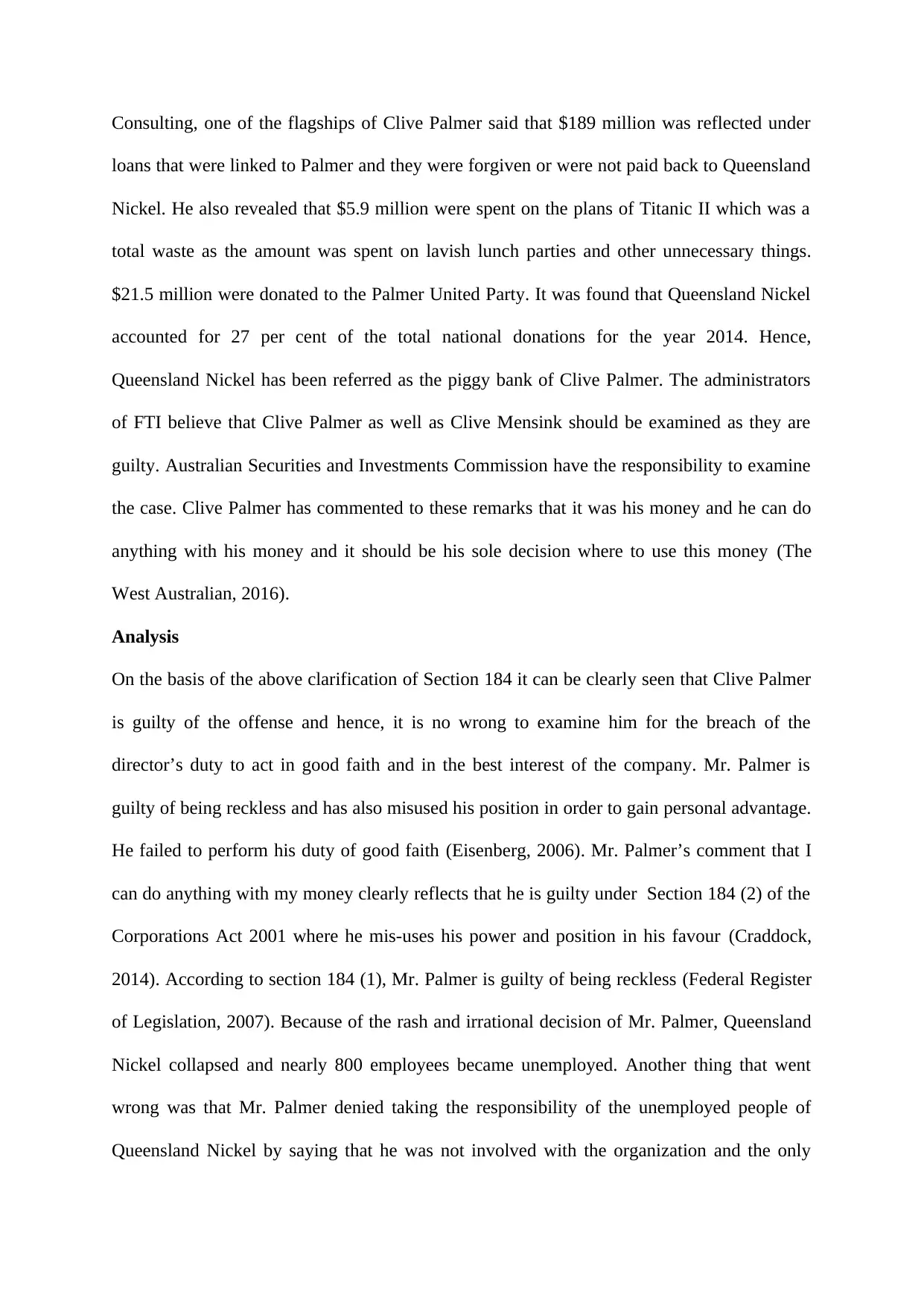
Consulting, one of the flagships of Clive Palmer said that $189 million was reflected under
loans that were linked to Palmer and they were forgiven or were not paid back to Queensland
Nickel. He also revealed that $5.9 million were spent on the plans of Titanic II which was a
total waste as the amount was spent on lavish lunch parties and other unnecessary things.
$21.5 million were donated to the Palmer United Party. It was found that Queensland Nickel
accounted for 27 per cent of the total national donations for the year 2014. Hence,
Queensland Nickel has been referred as the piggy bank of Clive Palmer. The administrators
of FTI believe that Clive Palmer as well as Clive Mensink should be examined as they are
guilty. Australian Securities and Investments Commission have the responsibility to examine
the case. Clive Palmer has commented to these remarks that it was his money and he can do
anything with his money and it should be his sole decision where to use this money (The
West Australian, 2016).
Analysis
On the basis of the above clarification of Section 184 it can be clearly seen that Clive Palmer
is guilty of the offense and hence, it is no wrong to examine him for the breach of the
director’s duty to act in good faith and in the best interest of the company. Mr. Palmer is
guilty of being reckless and has also misused his position in order to gain personal advantage.
He failed to perform his duty of good faith (Eisenberg, 2006). Mr. Palmer’s comment that I
can do anything with my money clearly reflects that he is guilty under Section 184 (2) of the
Corporations Act 2001 where he mis-uses his power and position in his favour (Craddock,
2014). According to section 184 (1), Mr. Palmer is guilty of being reckless (Federal Register
of Legislation, 2007). Because of the rash and irrational decision of Mr. Palmer, Queensland
Nickel collapsed and nearly 800 employees became unemployed. Another thing that went
wrong was that Mr. Palmer denied taking the responsibility of the unemployed people of
Queensland Nickel by saying that he was not involved with the organization and the only
loans that were linked to Palmer and they were forgiven or were not paid back to Queensland
Nickel. He also revealed that $5.9 million were spent on the plans of Titanic II which was a
total waste as the amount was spent on lavish lunch parties and other unnecessary things.
$21.5 million were donated to the Palmer United Party. It was found that Queensland Nickel
accounted for 27 per cent of the total national donations for the year 2014. Hence,
Queensland Nickel has been referred as the piggy bank of Clive Palmer. The administrators
of FTI believe that Clive Palmer as well as Clive Mensink should be examined as they are
guilty. Australian Securities and Investments Commission have the responsibility to examine
the case. Clive Palmer has commented to these remarks that it was his money and he can do
anything with his money and it should be his sole decision where to use this money (The
West Australian, 2016).
Analysis
On the basis of the above clarification of Section 184 it can be clearly seen that Clive Palmer
is guilty of the offense and hence, it is no wrong to examine him for the breach of the
director’s duty to act in good faith and in the best interest of the company. Mr. Palmer is
guilty of being reckless and has also misused his position in order to gain personal advantage.
He failed to perform his duty of good faith (Eisenberg, 2006). Mr. Palmer’s comment that I
can do anything with my money clearly reflects that he is guilty under Section 184 (2) of the
Corporations Act 2001 where he mis-uses his power and position in his favour (Craddock,
2014). According to section 184 (1), Mr. Palmer is guilty of being reckless (Federal Register
of Legislation, 2007). Because of the rash and irrational decision of Mr. Palmer, Queensland
Nickel collapsed and nearly 800 employees became unemployed. Another thing that went
wrong was that Mr. Palmer denied taking the responsibility of the unemployed people of
Queensland Nickel by saying that he was not involved with the organization and the only
Paraphrase This Document
Need a fresh take? Get an instant paraphrase of this document with our AI Paraphraser
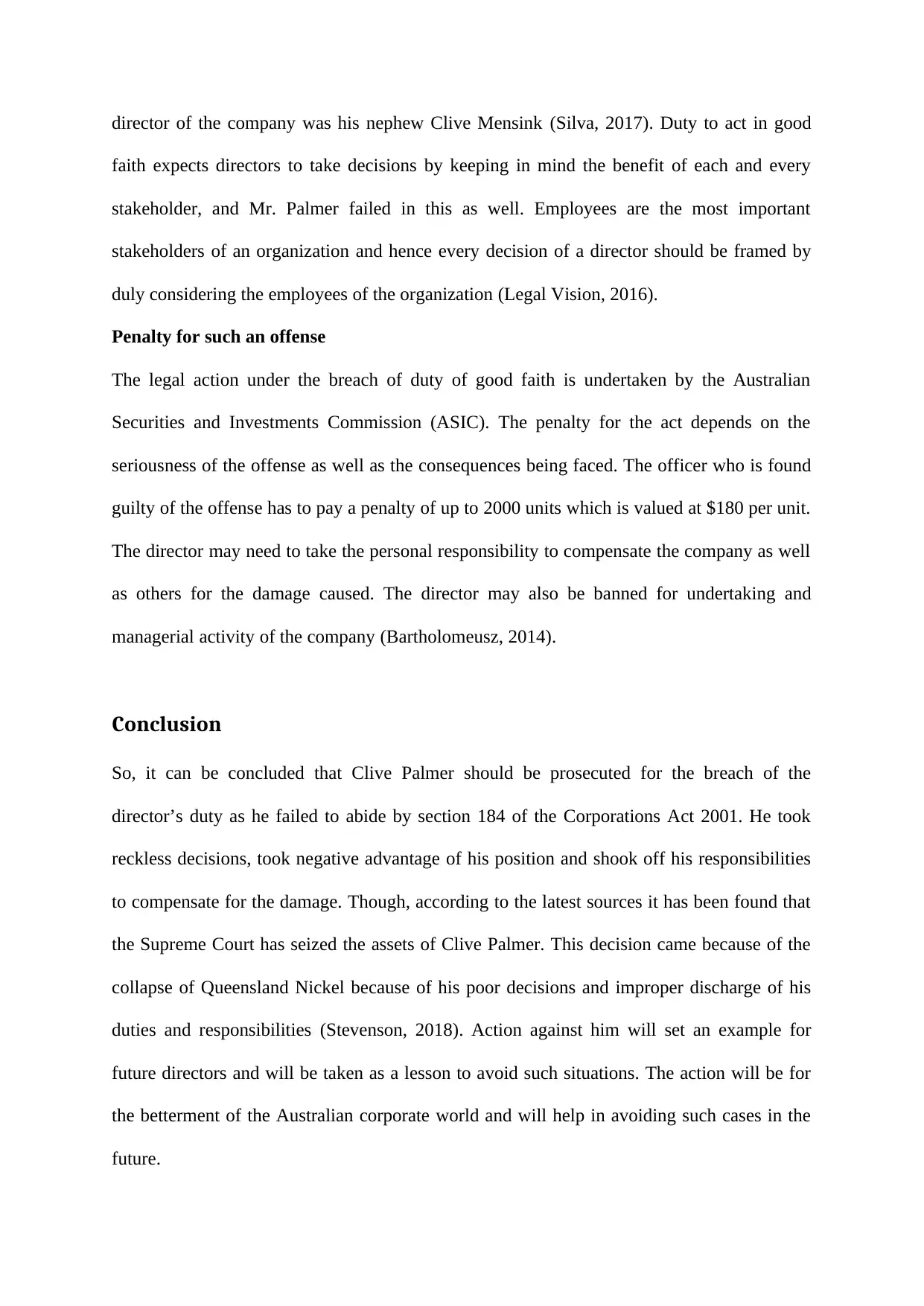
director of the company was his nephew Clive Mensink (Silva, 2017). Duty to act in good
faith expects directors to take decisions by keeping in mind the benefit of each and every
stakeholder, and Mr. Palmer failed in this as well. Employees are the most important
stakeholders of an organization and hence every decision of a director should be framed by
duly considering the employees of the organization (Legal Vision, 2016).
Penalty for such an offense
The legal action under the breach of duty of good faith is undertaken by the Australian
Securities and Investments Commission (ASIC). The penalty for the act depends on the
seriousness of the offense as well as the consequences being faced. The officer who is found
guilty of the offense has to pay a penalty of up to 2000 units which is valued at $180 per unit.
The director may need to take the personal responsibility to compensate the company as well
as others for the damage caused. The director may also be banned for undertaking and
managerial activity of the company (Bartholomeusz, 2014).
Conclusion
So, it can be concluded that Clive Palmer should be prosecuted for the breach of the
director’s duty as he failed to abide by section 184 of the Corporations Act 2001. He took
reckless decisions, took negative advantage of his position and shook off his responsibilities
to compensate for the damage. Though, according to the latest sources it has been found that
the Supreme Court has seized the assets of Clive Palmer. This decision came because of the
collapse of Queensland Nickel because of his poor decisions and improper discharge of his
duties and responsibilities (Stevenson, 2018). Action against him will set an example for
future directors and will be taken as a lesson to avoid such situations. The action will be for
the betterment of the Australian corporate world and will help in avoiding such cases in the
future.
faith expects directors to take decisions by keeping in mind the benefit of each and every
stakeholder, and Mr. Palmer failed in this as well. Employees are the most important
stakeholders of an organization and hence every decision of a director should be framed by
duly considering the employees of the organization (Legal Vision, 2016).
Penalty for such an offense
The legal action under the breach of duty of good faith is undertaken by the Australian
Securities and Investments Commission (ASIC). The penalty for the act depends on the
seriousness of the offense as well as the consequences being faced. The officer who is found
guilty of the offense has to pay a penalty of up to 2000 units which is valued at $180 per unit.
The director may need to take the personal responsibility to compensate the company as well
as others for the damage caused. The director may also be banned for undertaking and
managerial activity of the company (Bartholomeusz, 2014).
Conclusion
So, it can be concluded that Clive Palmer should be prosecuted for the breach of the
director’s duty as he failed to abide by section 184 of the Corporations Act 2001. He took
reckless decisions, took negative advantage of his position and shook off his responsibilities
to compensate for the damage. Though, according to the latest sources it has been found that
the Supreme Court has seized the assets of Clive Palmer. This decision came because of the
collapse of Queensland Nickel because of his poor decisions and improper discharge of his
duties and responsibilities (Stevenson, 2018). Action against him will set an example for
future directors and will be taken as a lesson to avoid such situations. The action will be for
the betterment of the Australian corporate world and will help in avoiding such cases in the
future.
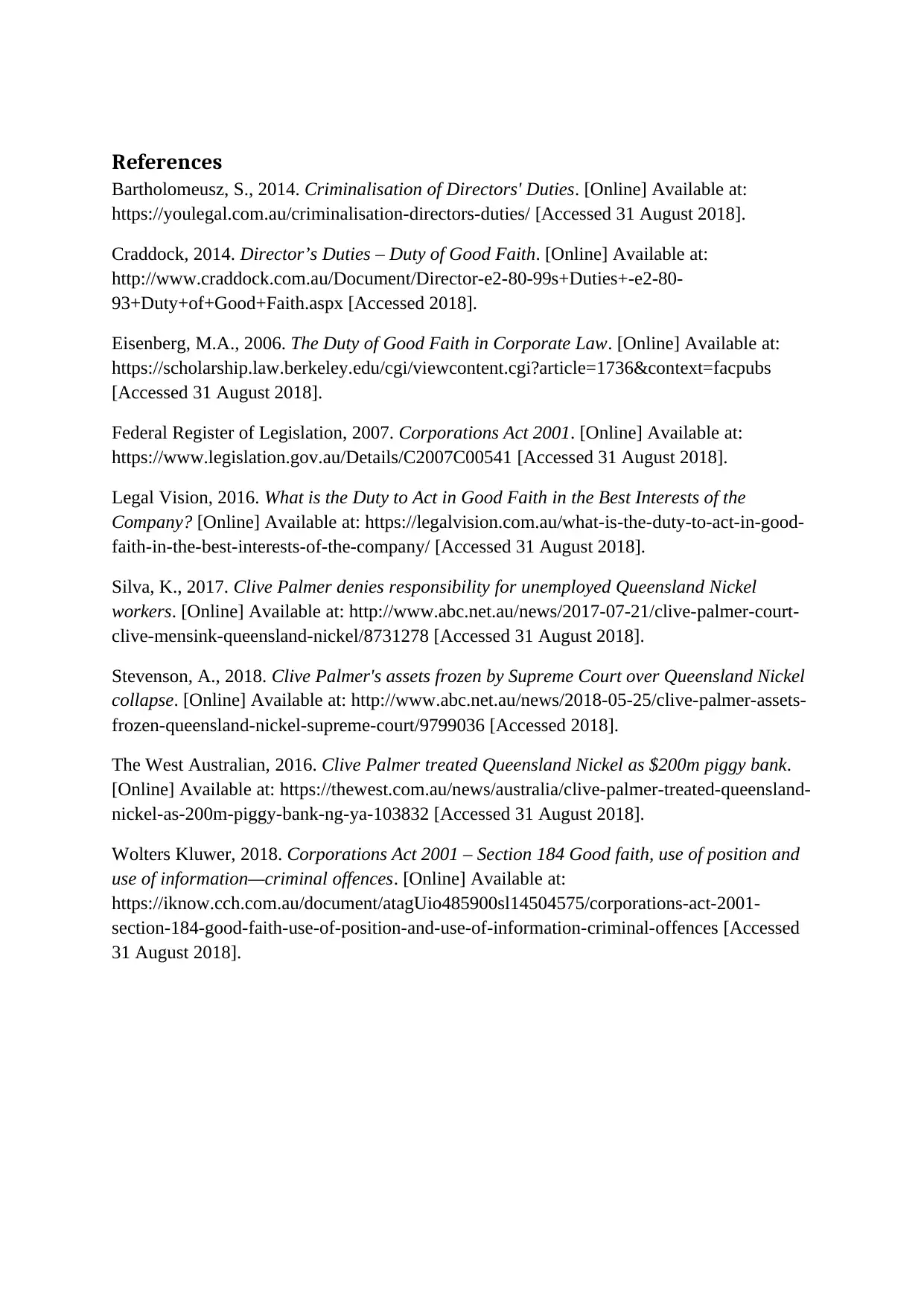
References
Bartholomeusz, S., 2014. Criminalisation of Directors' Duties. [Online] Available at:
https://youlegal.com.au/criminalisation-directors-duties/ [Accessed 31 August 2018].
Craddock, 2014. Director’s Duties – Duty of Good Faith. [Online] Available at:
http://www.craddock.com.au/Document/Director-e2-80-99s+Duties+-e2-80-
93+Duty+of+Good+Faith.aspx [Accessed 2018].
Eisenberg, M.A., 2006. The Duty of Good Faith in Corporate Law. [Online] Available at:
https://scholarship.law.berkeley.edu/cgi/viewcontent.cgi?article=1736&context=facpubs
[Accessed 31 August 2018].
Federal Register of Legislation, 2007. Corporations Act 2001. [Online] Available at:
https://www.legislation.gov.au/Details/C2007C00541 [Accessed 31 August 2018].
Legal Vision, 2016. What is the Duty to Act in Good Faith in the Best Interests of the
Company? [Online] Available at: https://legalvision.com.au/what-is-the-duty-to-act-in-good-
faith-in-the-best-interests-of-the-company/ [Accessed 31 August 2018].
Silva, K., 2017. Clive Palmer denies responsibility for unemployed Queensland Nickel
workers. [Online] Available at: http://www.abc.net.au/news/2017-07-21/clive-palmer-court-
clive-mensink-queensland-nickel/8731278 [Accessed 31 August 2018].
Stevenson, A., 2018. Clive Palmer's assets frozen by Supreme Court over Queensland Nickel
collapse. [Online] Available at: http://www.abc.net.au/news/2018-05-25/clive-palmer-assets-
frozen-queensland-nickel-supreme-court/9799036 [Accessed 2018].
The West Australian, 2016. Clive Palmer treated Queensland Nickel as $200m piggy bank.
[Online] Available at: https://thewest.com.au/news/australia/clive-palmer-treated-queensland-
nickel-as-200m-piggy-bank-ng-ya-103832 [Accessed 31 August 2018].
Wolters Kluwer, 2018. Corporations Act 2001 – Section 184 Good faith, use of position and
use of information—criminal offences. [Online] Available at:
https://iknow.cch.com.au/document/atagUio485900sl14504575/corporations-act-2001-
section-184-good-faith-use-of-position-and-use-of-information-criminal-offences [Accessed
31 August 2018].
Bartholomeusz, S., 2014. Criminalisation of Directors' Duties. [Online] Available at:
https://youlegal.com.au/criminalisation-directors-duties/ [Accessed 31 August 2018].
Craddock, 2014. Director’s Duties – Duty of Good Faith. [Online] Available at:
http://www.craddock.com.au/Document/Director-e2-80-99s+Duties+-e2-80-
93+Duty+of+Good+Faith.aspx [Accessed 2018].
Eisenberg, M.A., 2006. The Duty of Good Faith in Corporate Law. [Online] Available at:
https://scholarship.law.berkeley.edu/cgi/viewcontent.cgi?article=1736&context=facpubs
[Accessed 31 August 2018].
Federal Register of Legislation, 2007. Corporations Act 2001. [Online] Available at:
https://www.legislation.gov.au/Details/C2007C00541 [Accessed 31 August 2018].
Legal Vision, 2016. What is the Duty to Act in Good Faith in the Best Interests of the
Company? [Online] Available at: https://legalvision.com.au/what-is-the-duty-to-act-in-good-
faith-in-the-best-interests-of-the-company/ [Accessed 31 August 2018].
Silva, K., 2017. Clive Palmer denies responsibility for unemployed Queensland Nickel
workers. [Online] Available at: http://www.abc.net.au/news/2017-07-21/clive-palmer-court-
clive-mensink-queensland-nickel/8731278 [Accessed 31 August 2018].
Stevenson, A., 2018. Clive Palmer's assets frozen by Supreme Court over Queensland Nickel
collapse. [Online] Available at: http://www.abc.net.au/news/2018-05-25/clive-palmer-assets-
frozen-queensland-nickel-supreme-court/9799036 [Accessed 2018].
The West Australian, 2016. Clive Palmer treated Queensland Nickel as $200m piggy bank.
[Online] Available at: https://thewest.com.au/news/australia/clive-palmer-treated-queensland-
nickel-as-200m-piggy-bank-ng-ya-103832 [Accessed 31 August 2018].
Wolters Kluwer, 2018. Corporations Act 2001 – Section 184 Good faith, use of position and
use of information—criminal offences. [Online] Available at:
https://iknow.cch.com.au/document/atagUio485900sl14504575/corporations-act-2001-
section-184-good-faith-use-of-position-and-use-of-information-criminal-offences [Accessed
31 August 2018].
⊘ This is a preview!⊘
Do you want full access?
Subscribe today to unlock all pages.

Trusted by 1+ million students worldwide
1 out of 6
Related Documents
Your All-in-One AI-Powered Toolkit for Academic Success.
+13062052269
info@desklib.com
Available 24*7 on WhatsApp / Email
![[object Object]](/_next/static/media/star-bottom.7253800d.svg)
Unlock your academic potential
Copyright © 2020–2026 A2Z Services. All Rights Reserved. Developed and managed by ZUCOL.





![ASIC v Maxwell & Ors [2006] NSWSC 1052 Case: Corporations Law Analysis](/_next/image/?url=https%3A%2F%2Fdesklib.com%2Fmedia%2Fimages%2Fry%2F57e8c573017544d2978be5debb1abc0d.jpg&w=256&q=75)